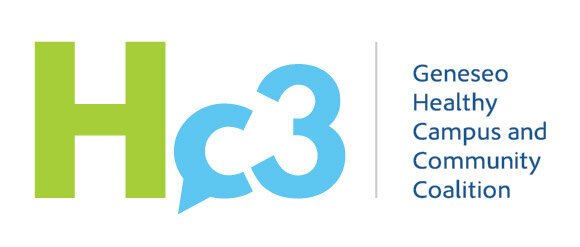
Binge Drinking
Binge drinking is defined as having five or more standard drinks for a male and 4 or more drinks for a female over a period of two hours
(A standard drink is 12 ounces of 5% alcohol beer, 5 ounces of wine, or one shot (1.5 ounces) of 80 proof liquor).
Binge drinking is a major problem on college campuses with sometimes serious consequences for students and communities.
Among Geneseo Students
In the National Survey on Drug Use and Health (NSDUH), an estimated 34.9 percent of young adults aged 18 to 25 in 2018 were binge drinkers in the past month, which corresponds to about 11.9 million young adults. Stated another way, more than a third of young adults in 2018 were current binge drinkers.
Among SUNY Geneseo students:
Nearly 42% had engaged in binge drinking one or more times in the past 30 days
13% had binged on six or more occasions
18% of students had had 8-10 drinks on one or more occasions
5% admitted to having 12-15 drinks on one or more occasions.
What contributes to heavy drinking among college students?
Easy access and availability
13% of students under 21 who drink said they get alcohol on-campus, while 49% say they drink at off-campus parties. Twelve percent got alcohol at home, and 25% had an older student buy it for them, or was given it by someone over 21.
Commonly held norms, beliefs and expectations
“Everyone does it.” When asked what percentage of students drink, 63% said 75% do, while 24% put it at nearly 100%.
“Not a big deal.” When asked “what would your friends say...” 44% stated that their friends would say there is nothing wrong with binge drinking on weekends, 38% would say there’s nothing wrong with providing alcohol to someone under 21.
“We work hard, so we party hard.” Whether conveyed through mass media or personal observation, a common belief is that all adults drink when they’ve had a stressful day, or when they want to have fun, socialize or deal with uncomfortable emotions.
Stress
92% of Geneseo students say they feel "overwhelmed by all I have to do." Academics are our students' top concern, and almost one-fifth of our students admit to doing poorly on a test or project due to alcohol use.
Dismissal of Consequences:
Students have been educated throughout their teen years about the health consequences of alcohol use. The problem is, most of these consequences don’t appear right away, or every time you drink, while the desirable effects usually do. Thus, students tend to dismiss or minimize the relevance or likelihood of these risks happening to them.
